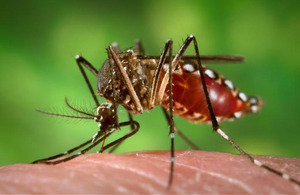Travellers urged to protect themselves from insect bites as dengue fever cases triple
PHE figures show an almost three-fold increase in the number of dengue fever cases reported.

Aedes mosquito
Figures from the Public Health England (PHE) have shown an almost three-fold increase in the number of dengue fever cases reported in returning travellers from England, Wales and Northern Ireland between January and April 2013 when compared to the same period last year.
To the end of April 2013, 141 confirmed and probable cases of dengue fever have been reported. In contrast there were 51 cases during the same period in 2012.
In 2011, the annual number of cases was 223 with 343 reported in 2012 – an increase of 54%.
Dengue fever is transmitted by mosquito bites and is common in tropical and subtropical parts of the world, affecting around 100 countries. The symptoms are typically a severe flu-like illness with severe headache, muscle pain and a rash. It cannot be spread from person-to-person and is rarely fatal.
There is no specific treatment for dengue fever, and in most people, symptoms can be managed by taking paracetamol, drinking plenty of fluids, and resting. A very small number of people can go on to develop more serious symptoms and need to be admitted to hospital.
Of the cases reported to PHE so far in 2013, 37 have reported travel to Thailand compared to 16 for the same period in 2012. The annual totals of cases who report travel to Thailand have also continued to increase year-on-year with 21 in 2011 and 58 in 2012.
Of the other travel destinations reported so far in 2013, 13 had been to Sri Lanka, 11 to Barbados, 9 to Brazil and 6 to Jamaica. Other sporadic cases have been acquired from travel to Asia, Africa and the Americas.
Dr Jane Jones, a travel-associated infection expert at PHE, said:
The increase in the numbers of people returning with dengue fever is concerning so we want to remind people of the need to practise strict mosquito bite avoidance at all times to reduce their risk of becoming unwell.
Of those who became unwell the majority had been to South East Asia and the Far East with the next highest proportions visiting the Indian Subcontinent, followed by the Caribbean. Anyone who develops a fever or flu-like symptoms within two weeks of returning from these areas should seek medical advice from NHS 111 or their GP.
Dr Dipti Patel, joint director of the National Travel Health Network and Centre (NaTHNaC), which is commissioned by PHE, said:
There is no specific preventive medicine or vaccination against dengue fever and prevention relies on avoiding mosquito bites particularly around dusk and dawn when the day biting mosquitoes are most active.
To minimise the risk of being bitten use appropriate insect repellents and wear appropriate clothing - such as long sleeve tops and trousers to reduce the amount of skin being exposed.
Notes to editors
- Health Protection Report with laboratory figures.
- The dengue fever data for England, Wales and Northern Ireland is collected by PHE’s Rare and Imported Pathogens Laboratory located at Porton Down
- Other information on dengue fever
- Information on insect bite avoidance and other travel information
- The National Travel Health Network and Centre (NaTHNaC) is commissioned by Public Health England and hosted by University College London Hospitals NHS Foundation Trust. It works in partnership with the London School of Hygiene and Tropical Medicine, the Liverpool School of Tropical Medicine, the Hospital for Tropical Diseases, the Department of Health and PHE to achieve its objective of improving standards in travel medicine.
- Public Health England is a new executive agency of the Department of Health that took up its full responsibilities on 1 April 2013. PHE works with national and local government, industry and the NHS to protect and improve the nation’s health and support healthier choices and will be addressing inequalities by focusing on removing barriers to good health. To find out more visit our website or follow us on Twitter @PHE_uk.
Public Health England Press Office
61 Colindale Avenue
London NW9 5EQ
Tel: 020 8327 7901
Out of hours telephone 0208 200 4400